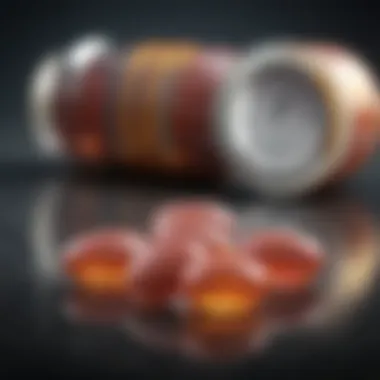Effective Treatments for Herpes Labialis Explained


Intro
Herpes labialis, also known as cold sores, is a common viral infection caused by the herpes simplex virus type 1 (HSV-1). It manifests as painful blisters on the lips and around the mouth. The infection is highly prevalent, affecting a large portion of the global population at some time in their lives. Understanding effective treatment options is essential for managing outbreaks and minimizing discomfort.
The goal is to highlight the key treatments available, including antiviral medications, over-the-counter options, and natural remedies. This exploration aims to inform readers about the effectiveness, safety, and potential side effects of each treatment, facilitating evidence-based decisions regarding their care. The following sections will delve into necessary background research, findings, and treatment discussions.
Understanding Herpes Labialis
Herpes labialis, commonly recognized as cold sores, carries significant implications for both physical health and psychological well-being. Understanding this condition is crucial for effective management and treatment. Knowledge of the herpes simplex virus, its transmission, symptoms, and diagnostic processes is essential. This understanding empowers individuals to make informed decisions about their health and treatment options.
Overview of Herpes Simplex Virus
Herpes simplex virus (HSV) includes two main types: HSV-1 and HSV-2. HSV-1 primarily causes oral lesions, while HSV-2 is more often associated with genital infections. Cold sores predominantly result from HSV-1. The virus establishes latency in the body after the initial infection, which can lead to recurrent outbreaks triggered by various factors such as stress, illness, or exposure to sunlight.
Many people with HSV-1 may not experience symptoms, but understanding how the virus works can help in preventing its spread. It is important to note that even when asymptomatic, the virus can still be transmitted to others. Knowing that it is contagious, especially during outbreaks, is crucial for limiting its spread.
Transmission and Symptoms
HSV-1 is transmitted through direct contact with infected individuals. This may occur through kissing, sharing utensils, or touching surfaces contaminated with the virus. Initial infections may present flu-like symptoms, including fever and swollen lymph nodes, along with the appearance of painful blisters around the mouth area.
The symptoms usually last about a week, but some individuals may experience frequent recurrences. Recurrences tend to be less severe than the initial outbreak. Recognizing the symptoms early can be beneficial for initiating treatment sooner, which may reduce severity and duration.
Diagnosis of Herpes Labialis
The diagnosis of herpes labialis often involves a physical examination and history taking. Healthcare professionals look for characteristic symptoms, such as blister-like lesions. In some cases, laboratory tests may be used to confirm the diagnosis, particularly if the symptoms are atypical. Tests may include PCR tests or viral culture swabs from the sore. Clinicians might also conduct blood tests to check for antibodies against HSV.
Recognizing the various diagnostic methods is vital for individuals experiencing symptoms. Proper diagnosis ensures appropriate treatment plans are initiated, minimizing the risk of complications and further transmission.
Understanding the nature of Herpes labialis can lead to more effective prevention and management strategies.
In summary, gaining clarity on herpes labialis establishes a foundation for effective treatment. This involves understanding the characteristics of the virus, how it spreads, its symptoms, and the ways it can be diagnosed. This knowledge not only enhances individual health management but also contributes to public health efforts aimed at containing the spread of the virus.
Antiviral Medications
Antiviral medications play a central role in the management of herpes labialis. These drugs specifically target the herpes simplex virus, seeking to reduce symptoms, shorten the duration of outbreaks, and prevent future occurrences. The importance of these medications lies not only in their ability to provide symptomatic relief but also in their potential to suppress viral activity in the body. This suppression can lead to fewer outbreaks and often milder symptoms.
When considering antiviral medications, it is critical to understand their mechanisms of action and how they can be best utilized in therapy. Different antivirals exist, each with unique characteristics and benefits. The choice of antiviral can be influenced by factors such as individual patient needs, frequency of outbreaks, and prior responses to treatment.
Mechanism of Antivirals
The mechanism of action of antiviral drugs typically involves inhibiting viral replication. These drugs block the ability of the herpes simplex virus to reproduce within human cells. This prevents the virus from spreading and allows the immune system to combat the remaining viral load more effectively. Antivirals are most effective when taken at the first sign of an outbreak, as they can diminish the severity and length of symptoms significantly.
Common Antiviral Agents
Several antiviral agents are frequently prescribed for herpes labialis. Each has distinct properties and efficacy.
Acyclovir


Acyclovir is one of the most well-known antiviral medications for herpes simplex virus. Its primary role is to slow down the growth of the virus and permit the immune system to work more efficiently. Acyclovir is popular because of its effectiveness and relatively low cost. One key characteristic of Acyclovir is its oral bioavailability, which allows for convenient administration. However, it does require frequent dosing, which some patients may find troublesome. Acyclovir is beneficial for both treatment and prevention of outbreaks.
Valacyclovir
Valacyclovir is another significant antiviral medication. It is a prodrug of Acyclovir, meaning it converts into Acyclovir in the body. This results in higher blood levels of the active drug, allowing for less frequent dosing. Valacyclovir is advantageous for patients who prefer a simplified dosing regimen, making it a favorable option for many. It generally leads to fewer side effects compared to Acyclovir, yet its cost may be higher.
Famciclovir
Famciclovir is a third option that offers some unique benefits. Similar to Valacyclovir, it functions as a prodrug, converting to an active form that inhibits viral replication. Famciclovir has a long half-life, allowing for less frequent dosage compared to Acyclovir. This can enhance adherence since patients do not have to remember multiple doses each day. However, its cost can be higher than other alternatives, which might limit access for some patients.
Efficacy and Dosage Recommendations
The efficacy of antiviral agents varies based on individual patient factors and the specific medication used. Overall, clinical studies suggest that early initiation of these medications can significantly shorten healing time and reduce symptoms. Depending on the severity and frequency of outbreaks, dosing will differ. For example, Acyclovir is often prescribed at a dosage of 400 mg, taken five times daily for five to ten days during an active outbreak.
Potential Side Effects
While antiviral medications are generally safe, they may come with side effects. Common side effects can include nausea, diarrhea, and headache. Less commonly, patients might experience dizziness or an allergic reaction. It is crucial for patients to discuss these potential side effects with their healthcare provider, ensuring they receive the most appropriate treatment based on their individual health profile.
Ultimately, antiviral medications are an essential component of managing herpes labialis, offering symptomatic relief and reduced outbreak frequency.
Over-the-Counter Treatments
Over-the-counter treatments play a crucial role in managing herpes labialis. They offer accessible options for individuals seeking relief from recurrent cold sores. Many people prefer these treatments for their convenience and effectiveness. OTC options provide immediate solutions without the need for a prescription, making them appealing for those who face occasional outbreaks. This section will detail various over-the-counter treatments, focusing on topical creams, oral pain relievers, and combination treatments that can help alleviate the symptoms of herpes labialis.
Topical Creams and Ointments
Topical creams and ointments are widely used in the management of herpes labialis. They work directly where the cold sore appears, providing targeted relief and support in healing the affected area.
Docosanol
Docosanol is a topical agent that has gained attention for its role in treating cold sores. The key characteristic of Docosanol is its ability to inhibit the virus from entering healthy skin cells. This mechanism reduces the duration and severity of outbreaks. It is a popular choice because it is available without a prescription and is relatively easy to apply.
One unique feature of Docosanol is its fast-acting formula. Users often report a reduction in symptoms when applied at the first sign of an outbreak. However, some individuals may find it less effective during severe cases. Overall, this topical treatment represents a beneficial option for those managing mild to moderate herpes labialis symptoms.
Lysine Creams
Lysine creams are another topical option that some individuals find effective for managing cold sores. Lysine, an essential amino acid, claims to inhibit the replication of the herpes simplex virus. This characteristic makes Lysine creams popular among those looking for a more natural approach to their treatment.
The unique feature of Lysine creams lies in their dual function: they may help soothe the skin and provide a moisture barrier to the sore. While they are generally regarded as safe, the evidence supporting their efficacy varies. Some users appreciate the additional skin soothing properties, while others might not experience significant relief.
Oral Pain Relievers
Oral pain relievers can play a supportive role in treating the discomfort associated with herpes labialis. Non-prescription pain medications, such as ibuprofen or acetaminophen, are effective in managing pain and reducing inflammation. These pain relievers act quickly and can be taken as needed to improve comfort levels during an outbreak.
Combination Treatments
Combination treatments often incorporate multiple modalities to tackle herpes labialis. For instance, a topical cream might be used alongside oral pain relievers to provide a comprehensive approach to healing and symptom management. Some products combine antiviral and soothing ingredients to create synergistic effects, enhancing the overall efficacy in treating cold sores.
Natural Remedies


Natural remedies for herpes labialis have gained attention for their potential benefits. Many individuals seek alternatives or complementary approaches to traditional treatments. The use of natural products may offer relief without the side effects that some medications can cause. However, it is important to understand that while these remedies can aid in managing symptoms, they are not replacements for prescribed antiviral therapies. Thus, they should be considered part of a broader treatment strategy.
Essential Oils
Essential oils are often touted for their antiviral properties. Among these, Tea Tree Oil and Peppermint Oil stand out for their unique contributions to managing herpes labialis.
Tea Tree Oil
Tea Tree Oil is known for its antiseptic and anti-inflammatory qualities. Its key characteristic is the presence of terpinen-4-ol, which has been shown to inhibit the growth of certain viruses. For herpes labialis, it may help reduce the duration and severity of outbreaks. The unique feature of Tea Tree Oil is its ability to penetrate the skin, potentially delivering its benefits more effectively. However, some individuals may experience skin irritation or allergic reactions, emphasizing the need for a patch test before widespread application.
Peppermint Oil
Peppermint Oil is another essential oil that can aid in treating cold sores. Its high menthol content provides a cooling sensation and can soothe discomfort. The potential for Peppermint Oil to reduce viral replication makes it a beneficial option. Moreover, it possesses anti-inflammatory properties that may assist in calming the skin. Despite these advantages, Peppermint Oil should be used with caution as it can also trigger allergic reactions in some people. Diluting it with a carrier oil is advisable to prevent irritation.
Homeopathic Options
Homeopathic remedies offer individualized approaches to treatment. They focus on stimulating the body's healing processes. Common homeopathic treatments for herpes labialis include Apis mellifica and Natrum muriaticum. The efficacy of these options varies between individuals, and proper guidance from a qualified homeopath is essential. Though some people report positive effects, scientific evidence supporting these modalities remains limited, meriting further investigation.
Dietary Considerations
Diet plays a crucial role in managing herpes labialis, particularly in terms of immune system support.
Foods to Eat
Incorporating certain foods can help bolster the immune system. Foods rich in lysine, such as yogurt, fish, and leafy greens, are often recommended as part of the diet. Lysine may inhibit the growth of the herpes virus. An increased intake of fruits and vegetables, full of antioxidants, can also provide protective benefits. The unique aspect of these foods is that they not only assist in reducing outbreak frequency but also contribute positively to overall health.
Foods to Avoid
Conversely, there are foods that may exacerbate herpes labialis symptoms. Foods high in arginine, such as nuts, chocolate, and certain grains, are believed to promote viral activity. Additionally, refined sugars can weaken the immune system, making outbreaks more likely. Understanding the impact of these foods can be beneficial, as avoiding them may lead to a reduction in the frequency and severity of cold sore outbreaks.
A balanced approach, combining food choices with appropriate natural remedies, may enhance the management of herpes labialis.
Preventive Measures
Preventive measures play a crucial role in managing herpes labialis, commonly referred to as cold sores. These steps help minimize the frequency and severity of outbreaks. Understanding how to implement effective preventive strategies can empower individuals to take control of their health.
Lifestyle Adjustments
Making thoughtful lifestyle adjustments is essential for preventing herpes labialis outbreaks. Certain behaviors can trigger the virus, including sun exposure, fatigue, and illness. Protecting your skin from UV rays by using sunscreen may reduce outbreaks. Getting adequate sleep and maintaining a balanced diet can enhance the immune response, possibly reducing the likelihood of outbreaks. Regular exercise also contributes to overall well-being, further supporting immune function.
- Stay Hydrated: Drinking enough water helps maintain healthy skin, which can be beneficial.
- Avoid Triggers: Identify personal triggers, whether they are stress-related or dietary, such as chocolate or nuts.
These adjustments are simple yet effective in decreasing outbreak frequency.
Hygiene Practices
Proper hygiene is vital in controlling the herpes simplex virus. Maintaining cleanliness reduces the risk of spreading the virus to others and minimizes the chances of secondary infections. Here are some key hygiene practices to consider:
- Wash Hands Frequently: Regular handwashing, especially after touching the mouth or face, can help prevent spreading the virus.
- Avoid Sharing Personal Items: Items like towels, utensils, or lip balms can carry the virus.
- Keep Lesions Clean: If an outbreak occurs, gently clean the affected area and avoid picking at sores to prevent further irritation or infection.


Implementing these practices in daily life can create a significant barrier against outbreaks.
Stress Management Techniques
Stress is a known trigger for herpes labialis. Managing stress effectively can lead to fewer outbreaks and improved quality of life. Techniques that foster relaxation can be beneficial:
- Mindfulness and Meditation: Practicing mindfulness or meditation can reduce stress levels significantly. Consider taking a few minutes each day for deep breathing exercises or focused meditation.
- Physical Activity: Engage in activities such as yoga or tai chi, which promote relaxation and reduce stress.
- Adequate Sleep: Prioritizing sleep is essential for recovery and overall health. Aim for 7-9 hours of quality sleep each night.
"Managing stress not only supports emotional well-being but is also vital in preventing physical manifestations, including outbreaks of herpes labialis."
By incorporating these techniques into daily life, individuals can enhance resilience against stress and ultimately reduce the incidence of cold sore outbreaks.
Current Research and Future Directions
Research on herpes labialis continues to evolve, revealing new insights and advancements in treatment options. This section highlights emerging treatments, developments in vaccine research, and the intriguing role of the microbiome, emphasizing their significance in effectively managing this common viral infection.
Emerging Treatments
Recent studies have identified several promising treatments that go beyond traditional antiviral medications. Researchers explore new formulations that may enhance efficacy against herpes simplex virus. Some examples include topical agents with enhanced absorption and novel delivery systems that target infected cells more specifically.
One such approach is the use of nanotechnology, which can improve the delivery of antiviral drugs directly to the site of infection. Such innovations aim to reduce dosage frequency and side effects while maximizing effectiveness. These advancements offer hope for patients experiencing recurrent outbreaks or those who are unresponsive to conventional therapies.
Vaccine Development
Vaccine research for herpes simplex virus has gained momentum in recent years. The development of a safe and effective vaccine could significantly reduce the incidence of herpes labialis, preventing primary and recurrent infections. Current clinical trials focus on various vaccine platforms, including live attenuated, subunit, and mRNA vaccines.
The main goal is to induce robust immune responses that can recognize and combat the virus efficiently. Preliminary results from early-stage trials show promise, with some candidates eliciting strong antibody and T-cell responses. A successful vaccine would not only benefit individuals at risk of infection but also contribute to public health efforts aimed at controlling herpes virus transmission.
Role of the Microbiome
The human microbiome has garnered attention in recent research for its potential influence on various health conditions, including herpes labialis. The microbiome comprises trillions of microorganisms residing in the human body and plays a crucial role in immune regulation and pathogen interaction.
Studies suggest that an imbalance in the microbiome might influence the frequency and severity of herpes outbreaks. Some researchers are investigating whether probiotics or other microbiome-modulating interventions can enhance resistance to herpes simplex virus. Understanding this relationship could lead to novel preventive strategies that are more targeted and effective.
"Understanding the microbiome's role in herpes simplex infections could revolutionize treatment and prevention strategies, paving the way for a more comprehensive approach to managing herpes labialis."
Research in these areas is crucial, as it offers avenues for improved management of herpes labialis, ultimately benefiting patients seeking effective options. The combination of emerging treatments, vaccine advancements, and microbiome studies represents a significant leap forward in addressing this prevalent viral infection.
Culmination
The importance of exploring the best treatment options for herpes labialis cannot be overstated. This viral infection not only affects physical appearance but can also lead to psychological discomfort due to recurrent outbreaks. Understanding the various paths to treatment ensures that individuals can make informed decisions tailored to their unique circumstances.
Summary of Treatment Options
In this article, we have examined several key treatment modalities, including antiviral medications like Acyclovir, Valacyclovir, and Famciclovir. Each of these agents holds different potencies and administration routes, which can directly influence their effectiveness in managing outbreaks.
Furthermore, over-the-counter treatments, such as Docosanol and various topical ointments, provide users with additional options. These are often more accessible and can serve those who prefer a non-prescription route. Natural remedies combined with lifestyle adjustments and preventive measures also contribute positively to treatment efficacy.
"A comprehensive approach that combines medications, topical treatments, and lifestyle considerations significantly enhances the managing of herpes labialis."
Final Recommendations
Ultimately, the choice of treatment should be guided by several factors, including severity of symptoms, frequency of outbreaks, and individual health considerations. It is advisable to consult healthcare professionals when selecting a treatment plan. Moreover, maintaining healthy hygiene practices and managing stress levels can aid in reducing outbreaks.
Incorporating both medical and natural remedies may provide the best outcomes. Lastly, staying abreast of current research developments in herpes treatments can empower patients to take control of their health. Integrating these recommendations will foster a more informed and proactive approach toward managing herpes labialis.







